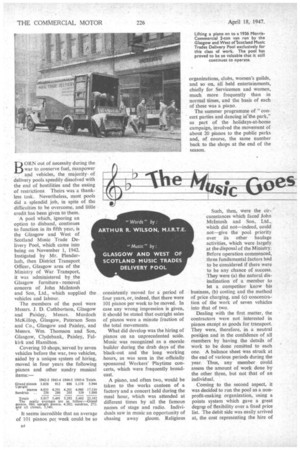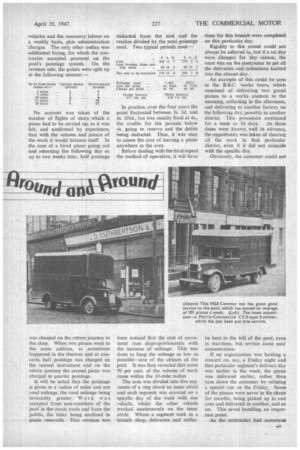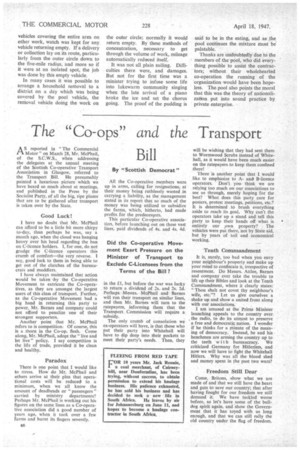B ORN out of necessity during the war to conserve fuel,
Page 38

Page 39

Page 40

If you've noticed an error in this article please click here to report it so we can fix it.
manpower . and vehicles, the majorityof delivery pools speedily dissolved with the end of hostilities and the easing of restrictions Theirs was a thankless task. Nevertheless, most pools did a splendid job, in spite of the difficulties to be overcome, and little credit has been given to them. A pool which, ignoring an option to disband, continues to function in its fifth year, is the Glasgow and West of Scotland Music Trade De livery Pool, which came into being on November 1, 1942. Instigated by Mr. Piender luth, then District Transport Officer, Glasgow area of the Ministry of War Transport, it was administered by the Glasgow furniture removal concern of John McIntosh and Son, Ltd., which supplied the vehicles and labour.
The members of the pool were Messrs. J. D. Cuthbertson, Glasgow and Paisley, Messrs. Murdoch McKillop, Glasgow, Paterson Sons and Co., Glasgow and Paisley, and Messrs. Wm. Thomson and Son, Glasgow, Clydebank, Paisley, Falkirk and Hamilton.
Covering 10 shops, served by seven vehicles before the war, two vehicles, aided by a unique system of hiring, moved in four years the following pianos and other sundry musical items:—
1942-31943-4 1944-5 1945-6 Totals.
Grand pianos 1,028 912 886 1,118 3,944 Upright Pianos 4.633 4,291 4.201 4,005 17.130 Sundries 256 288 205 339 1,088 Totals 5.917 5,491 5.292 5,462 22,162 The yearly averages are as follow:--Grand pianos, 986; upright pianos, 4,282; sundries, 272: and all classes, 5,540.
It seems incredible that an average of 101 pianos per week could be so na consistently moved for a period of four years, or, indeed, that there were 101 pianos per week to be moved. In case any wrong impression is given, it should be stated that outright sales of pianos were a minute fraction of the total movements.
What did develop was the hiring of pianos on an unprecedented scale. Music was recognized as a morale builder during the drab days of the black-out and •the long working .hours, as was seen in the officially sponsored Workers' Playtime concerts, which were frequently broadcast.
A piano, and often two, would be taken to the works canteen of a factory and a concert held during the meal hour, which was attended at different times by all the famous names of stage and radio. Individuals saw in music an opportunity of chasing away gloom. Religious organizations, clubs, women's guilds, and so on, all held entertainments, chiefly for Servicemen and women, much more frequently than in normal times, and the basis of each of these was a piano.
The summer programme of "concert parties and dancing idthe park," as part of the holidays-at-home campaign, involved the movement of about 20 pianos to the public parks and, of course, the same number back to the shops at the end of the season.
Such, then, were the cir cumstances which faced John McIntosh and Son, Ltd., which did not—indeed, could not—give the pool priority over its other haulage activities, which were largely at the disposal of the Ministry. Before operation commenced, three fundamental factors had to be considered if there were to be any chance of success. They were (a) the natural disinclination of a member to let a competitor know his business, (b) costing and the method of price charging, and (c) concentration of the work of seven vehicles into that of two.
Dealing with the first matter, the contractors were not interested in pianos except as goods for transport. They were, therefore, in a neutral position and in the confidence of all members by having the details of work to be done remitted to each one. A balance sheet was struck at the end of various periods during the year. Thus, any member could assess the amount of work done by the other three, but not that of an individual.
Coming to the second aspect, it was decided to run the pool as a nonprofit-making organization, using a points system which gave a great degrqe of flexibility over a fixed price list. The debit side was easily arrived at, the cost representing the hire of vehicles and the necessary labour on a weekly basis, plus administration charges. The only other outlay was additional hiring, for which the contractor accepted payment on the pool's pointage system. On the revenue side, the points were split up in the following manner:—
No account was taken of the number of flights of stairs which a piano had to be carried up, as it was felt, and confirmed by experience, that with the volume and nature of the work it would balance itself. In the case of a hired piano going out and returning the following day or up to two weeks later, half pointage was charged on the return journey to the shop. When two pianos went to the same address, as sometimes happened in the theatres and at concerts, halt pointage was charged on the second instrument and on the return journey the second piano was charged at quarter pointage.
It will be noted that the pointage is given as a radius of miles and not road mileage, the road mileage being invariably greater. Work w as accepted from non-members of the • pool in the music trade and from the • public, the tatter being confined to piano removals. This revenue was deducted from the cost and the residue divided by the total pointage used. Two typical periods read:— In practice, over the four years the point fluctuated between 3s. 3d. and 4s. 10-Id., but was usually fixed at 45., the credits for the periods below 4s. going to reserve and the debits being deducted. Thus, it was easy to assess the cost of moving a piano anywhere in the area.
Before dealing with the third aspect the method of operation, it will have been noticed that the cost of movement rises disproportionately with the increase of mileage. This was done to keep the mileage as low as, possible—one of the objects of the pool. It was then revealed that some 90 per cent. of the volume of work came within the 10-mile radius.
The area was divided into five segments of a ring about an inner circle and each segment was covered on a specific day of the week with one vehicle, whilst the other vehicle worked continuously on the inner circle. Where a segment took in a branch shop, deliveries and collec
tions for this branch were completed on this particular day.
Rigidity to this extent could not always be adhered to, but if a set day Mere chansd. for any reason, the onus was on the contractor to get all the deliveries and collections knitted into the altered day.
An example of this could be seen in the B.B.C. works tours, which consisted of delivering two grand pianos to a works canteen in the morning, collecting in the afternoon, and delivering to another factory on the following day, possibly in another district. This procedure continued for a week or 10 days. As these dates were known well in advance, the opportunity was taken of clearing all the work in that particular district, even if it did not coincide with the specific day.
Obviously, the customer could not be bent to the will of the pool, even in war-time, but service came near concentration.
If an organization was holding a concert on, say, a Friday night and that particular segment's delivery day was earlier in the week, the piano was delivered earlier, rather than turn down the customer by refusing a special run on the Friday. Some of the pianos were never in the shops for months, being picked up in one area and delivered in another, and so on. This saved handling, an important point.
As the contractor had numerous vehicles covering the entire area on other work, watch was kept for any vehicle returning empty. If a delivery or collection lay on its route, particularly from the outer circle down to the five-mile radius, and more so if it were at an isolated spot, the job was done by this empty vehicle.
In many cases it was possible to arrange a household removal to a district on a day which was being covered by the pool vehicle, the removal vehicle doing the work on the outer circle: normally it would return empty. By these methods of concentration, necessary to get through the volume of work, mileage automatically reduced itself.
It was not all plain sailing. Difficulties there were, and damages. But not for the first time was a minister trying to infuse some life into lukewarm community singing when the late arrival of a piano broke the ice and set the chorus going. The proof of the pudding is said to be in the eating, and as the pool continues the mixture must be palatable.
Thanks are undoubtedly due to the members of the pool, who did everything possible to assist the contractors; without their wholehearted co-operation the running of the organization would have been hopeless. The pool also points the moral that this was the theory of nationalization put into sound practice by private enterprise.




















































































